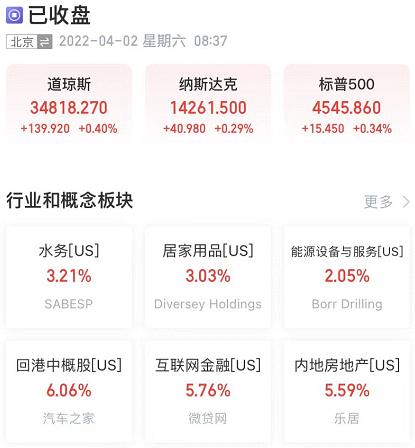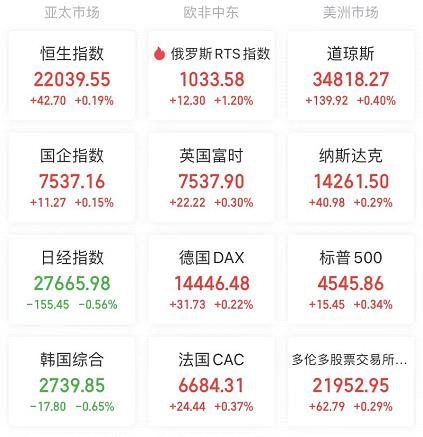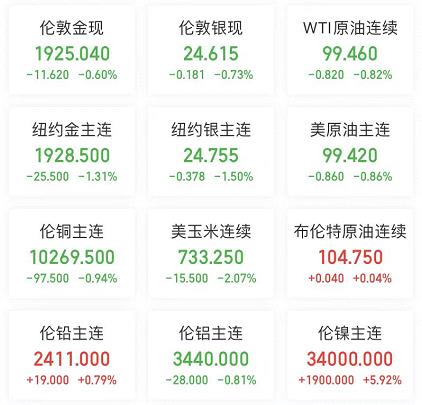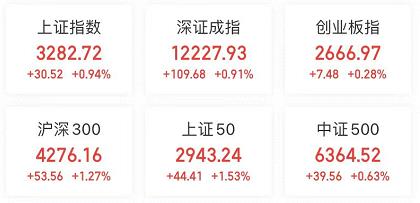On Friday, local time, with the last-minute leap before the close, the three major indexes in the United States collectively turned red, temporarily stopping the continuous decline in the previous two days and making it difficult to get a good start in April. The difficult trend is enough to show that under heavy pressure, the market is still in the struggling stage where the Federal Reserve is about to raise interest rates aggressively and the geographical situation is still unclear.
China Stock Exchange rebounded strongly. Netease Pinduoduo Baidu rose over 6%, leading the Nasdaq 100, bilibili rose nearly 8%. Among the new energy automobile stocks, Xpeng Motors rose nearly 6%, LI rose over 5% and Weilai Automobile rose over 4%.
[overnight U.S. stocks]

[global index]

[global goods]

[Shanghai Stock Exchange Index]

[overnight news]
The minutes of the FOMC meeting revealed the determination to raise interest rates.
The good news for investors is that April is usually the best month for US stocks in a year. Sam Stovall, chief investment strategist of CFRA, explained that the probability of the S&P 500 index rising in April since World War II reached 70%, with an average increase of 1.7%. In contrast, the average increase of the S&P 500 index in all months is 0.7%.
However, it is obvious that "usually" is not suitable to describe April 2022 at a time when guns are rumbling in Ukraine and the Federal Reserve is stepping on the accelerator of raising interest rates.
Members of the International Energy Agency agreed to work with the United States to release oil reserves on a large scale.
After the United States announced an unprecedented plan to release reserve oil, in order to alleviate the economic damage caused by high energy prices, several American allies also intend to join the Biden administration.
Hidechika Koizumi, an official of Japan’s Ministry of Economy, Trade and Industry, said that members of the International Energy Agency (IEA) agreed to release a new round of emergency fuel reserves on Friday. The time and quantity of oil discharge in each country will be decided later.
The steady growth of non-farm employment in the United States in March may push the Fed to raise interest rates by 50 basis points in May.
In the United States, jobs continued to grow strongly in March, and wages accelerated again, which will make it possible for the Federal Reserve to raise interest rates by 50 basis points in May.
The data shows that the number of non-agricultural employees in the United States increased by 431,000 after the seasonal adjustment in March; The unemployment rate recorded in March was 3.6%, continuing to hit a new low since February 2020; In March, the average hourly wage recorded an annual rate of 5.6%, slightly higher than expected.
[company news]
In March, the ranking of the delivery of new car-making forces fluctuated violently: the zero-run delivery broke the bottom of Wanweilai’s "accident" for the first time.
On April 1st, the new force of making cars released the delivery in March. After experiencing a brief downturn in February caused by the Spring Festival holiday, the delivery volume of Xpeng Motors, Nezha Automobile, LI and Zero Run Automobile all exceeded 10,000 in March, among which, Zero Run achieved delivery of over 10,000 since its first delivery in July 2019; However, Weilai Automobile unexpectedly bottomed out in March.
Toyota continues to press GM to lead the US market in March.
On Friday, local time, a number of car manufacturers released sales data for March this year, among which Toyota, a Japanese car company, slightly surpassed GM’s 512,846 vehicles with 514,592 vehicles, ranking first in the US market. It is worth mentioning that the sales data of the two car companies decreased by 15% and 20% respectively. Affected by the surge in oil prices, hybrid models, which account for a quarter of Toyota’s sales, only fell by 3.9% in March.
Worried about the decline in smartphone consumption, JPMorgan Chase analysts removed Apple and Qualcomm from the list of concerns
JPMorgan Chase analysts removed Apple and Qualcomm from the "watch list", which contains the stocks most recommended by analysts. The bank said that due to the possible decline in consumer spending, iPhone SE may not meet the previous high sales expectations, and Apple’s software service revenue may also usher in a headwind; The weak demand for low-end Android phones will have an impact on Qualcomm.
关于作者